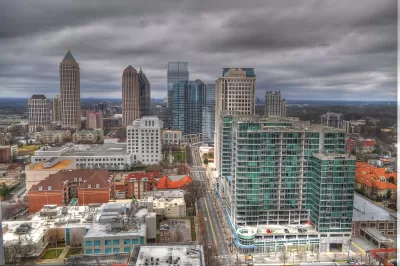The southern city’s growth is prompting questions about how to increase the housing supply, maintain affordability, and accommodate new residents.

The debate between those who want to preserve single-family zoning and housing advocates who say increases in density are necessary to make housing affordable is heating up in cities and non-urban areas around the country as the housing crisis spreads. As Sean Keenan reports in Atlanta Civic Circle, Atlanta is no different.
In metropolitan Atlanta, “NIMBY” groups concerned about ‘neighborhood character’ and the negative impacts of density increases are finding themselves in conflict with growth advocates who say increasing density is the only way to keep housing affordable for all income levels.
According to Abundant Housing Atlanta co-founder Alison Grady, “Atlanta is becoming more and more unaffordable, in large part due to the outdated zoning code that encourages suburban sprawl and huge homes on huge properties and discourages—or outright bans—more affordable options, such as tiny homes, duplexes, and small apartment and condo buildings.” Now, cities in the Atlanta metro are rewriting decades-old zoning codes to accommodate more growth and create more affordable housing for a growing population. “If Atlanta, Clarkston, and other metro-area cities truly want to make intown living attainable for lower-income residents—and ‘mitigate some of the negative social and environmental impacts of urban sprawl’—upzoning should be part of the equation,” says Sonia Hirt, a planning scholar from the University of Georgia. Atlanta itself is undergoing a revision of its zoning code, scheduled for completion in summer 2024, while other local cities are loosening regulations on ADUs and other ‘missing middle housing.’
FULL STORY: As metro Atlanta cities rewrite zoning laws, will they follow national trend of embracing density?

Alabama: Trump Terminates Settlements for Black Communities Harmed By Raw Sewage
Trump deemed the landmark civil rights agreement “illegal DEI and environmental justice policy.”

Study: Maui’s Plan to Convert Vacation Rentals to Long-Term Housing Could Cause Nearly $1 Billion Economic Loss
The plan would reduce visitor accommodation by 25% resulting in 1,900 jobs lost.

Planetizen Federal Action Tracker
A weekly monitor of how Trump’s orders and actions are impacting planners and planning in America.

Waymo Gets Permission to Map SF’s Market Street
If allowed to operate on the traffic-restricted street, Waymo’s autonomous taxis would have a leg up over ride-hailing competitors — and counter the city’s efforts to grow bike and pedestrian on the thoroughfare.

Parklet Symposium Highlights the Success of Shared Spaces
Parklets got a boost during the Covid-19 pandemic, when the concept was translated to outdoor dining programs that offered restaurants a lifeline during the shutdown.

Federal Homelessness Agency Places Entire Staff on Leave
The U.S. Interagency Council on Homelessness is the only federal agency dedicated to preventing and ending homelessness.
Urban Design for Planners 1: Software Tools
This six-course series explores essential urban design concepts using open source software and equips planners with the tools they need to participate fully in the urban design process.
Planning for Universal Design
Learn the tools for implementing Universal Design in planning regulations.
Caltrans
Smith Gee Studio
Institute for Housing and Urban Development Studies (IHS)
City of Grandview
Harvard GSD Executive Education
Toledo-Lucas County Plan Commissions
Salt Lake City
NYU Wagner Graduate School of Public Service





























